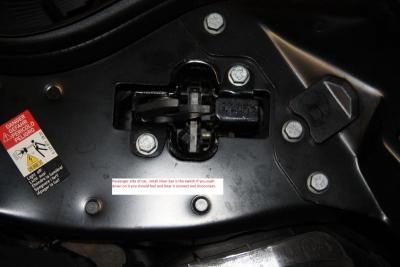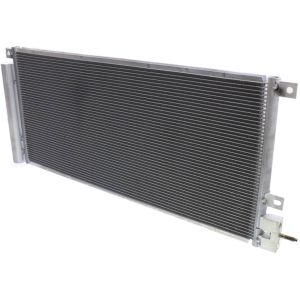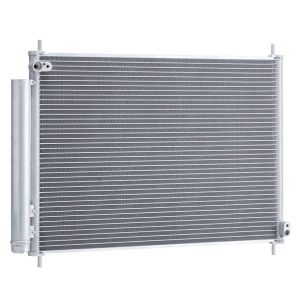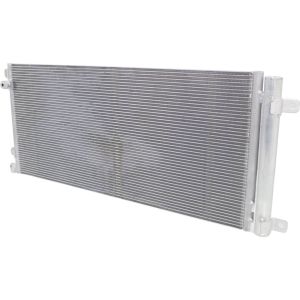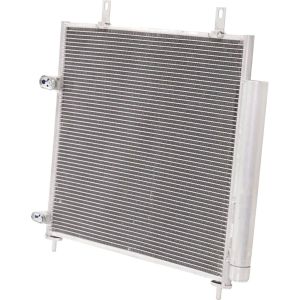Your car's AC condenser is an essential component in the air conditioning system. It works by converting the high-pressure refrigerant gas from the compressor into a cooler high-pressure liquid. This transformation process lets you enjoy the cool air inside your car.
There's a bit more to this handy piece of technology though, getting familiar with its various types, working mechanism, and the advantages it offers can let you appreciate its complexity. Think about the impact on comfort and fuel efficiency. There's a world of info waiting for you with just a touch more exploration.
Key Takeaways:
- An AC condenser in a car is a crucial component of the air conditioning system that transforms high-pressure vapor into high-pressure liquid.
- This transformation process cools the air, providing a comfortable temperature inside the vehicle.
- Common types of car AC condensers include tube and fin condensers, serpentine condensers, and those made of aluminum or copper-brass.
- Regular maintenance, including cleaning and annual check-ups, can prevent issues like leaks and overheating in the AC condenser.
- A well-maintained AC condenser enhances the driving experience, improves energy efficiency, reduces CO2 emissions, and promotes the longevity of the AC system.
What Is an AC Condenser?
An AC condenser, a key component in your car's air conditioning system, works to cool and condense refrigerant vapor into liquid. Its vital functioning is important to keep you cool in sweltering heat. So, what are some maintenance tips?
To start with, regular cleaning helps prevent dust and dirt accumulation that can hamper performance. Next, get it checked annually by a professional to spot any potential issues.
Speaking of common issues, leaks are a frequent problem due to physical damage or corrosion. Overheating can also occur if the condenser is blocked or the fan is defective. If your car's AC isn't cooling as it should, the condenser might be the culprit. Remember, timely maintenance can save you from bigger headaches down the road.

History and Innovations
While you're appreciating the cool air from your car's AC, it's intriguing to explore the history and innovations that brought us this comfort. Pioneers like Dr. John Gorrie and Willis Carrier set the groundwork for modern air conditioning.
Their efforts, coupled with the drive to increase efficiency due to the 1970s energy crisis, revolutionized AC systems. Innovations have led to units that use about 50% less energy than before, saving you money and reducing carbon emissions.
Looking ahead, future trends in AC technology are fascinating. Initiatives by entities like the Energy Department are focused on creating eco-friendlier, more efficient systems. The goal is to phase out harmful refrigerants and continue reducing energy consumption, ensuring a comfortable and sustainable future.
What Are the Different Types?
Diving into the world of car AC systems, you'll find various types, each with unique features and functionalities. Among the most common condenser types are the tube and fin condenser, and the serpentine condenser.
The tube and fin, known for its durability and low cost, uses tubes and fins for heat transfer. On the other hand, the serpentine condenser, named for its snake-like layout, is compact and efficient, but often pricier.
As for condenser materials, aluminum is commonly used. It's lightweight, corrosion-resistant, and excellent at dissipating heat. However, copper-brass condensers, while heavier and more susceptible to corrosion, are praised for their superior heat transfer capabilities.
In comparison, the choice between these materials will often depend on your specific needs for durability and performance.
 How Does the Car AC Condenser Work?
How Does the Car AC Condenser Work?
In your car's AC system, the condenser plays a critical role, transforming the refrigerant's heat into cool air for your comfort. This cooling process begins when the refrigerant enters the condenser as a high-pressure vapor. The condenser then cools this vapor, turning it into a high-pressure liquid ready for circulation.
Efficiency standards have greatly improved condenser performance over time, making them more effective in this cooling process. However, it's not just about creating a comfortable environment.
The environmental impact of these systems is a significant consideration. Future technologies aim to reduce this by developing more sustainable and efficient AC systems. By understanding how your car's AC condenser works, you'll appreciate the complex engineering and ongoing innovation that keeps you cool on the move.
What Advantages Do They Have?
Car AC condensers provide several significant advantages, not only for your comfort but also for your vehicle's overall performance. One of the primary benefits of an effective AC condenser is its contribution to energy efficiency. This not only helps you save on fuel costs but also reduces your car's environmental impact.
Here are some key advantages:
- They help in maintaining a comfortable temperature inside your car, enhancing your driving experience.
- Advanced AC condensers improve energy efficiency, reducing the fuel consumption of your car.
- They play an integral role in protecting the environment by reducing CO2 emissions.
- A well-functioning AC condenser promotes the longevity of your car's AC system, saving you from costly repairs.
Conclusion
Who knew that the unsung hero of your summer road trips was a small part called the AC condenser? This unassuming device, often unnoticed, works tirelessly keeping you cool and comfortable.
Funny, isn't it? While you're enjoying a chilled ride, it's sweating out there in the heat. Now that you're in the know, next time your AC chills you down, give a silent nod to your car's hardworking AC condenser.
FAQs (Frequently Asked Questions)
What Is the Average Lifespan of a Car AC Condenser?
- You're asking about the lifespan of a car AC condenser. Typically, with good maintenance and considering condenser materials and efficiency, it can last 10 to 15 years. But, it really depends on car usage and climate.
How Often Should a Car AC Condenser Be Serviced or Replaced?
- You should service your car's AC condenser for seasonal maintenance annually to guarantee peak condenser efficiency. If it's functioning poorly, replacement is typically required every 10-15 years, but varies based on usage and maintenance.
What Are the Common Signs of a Failing Car AC Condenser?
- You'll know your AC condenser's failing when you experience reduced cooling, unusual noises, or leaks in your car. These condenser symptoms should prompt immediate condenser repairs to restore your vehicle's comfort and efficiency.

